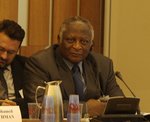Bernard MUNA
contribution 29 -
MUNA Bernard Acho

original version
Thank you, Mr. Chairman. I was just listening to my eloquent speaker of my friend Mr. Roux when he was talking about when he sees an accused persons, he sees a human being. I think we all see the same, but when we put the work of the Tribunal, in fact, these crimes are called crimes against humanity. They are crimes against humanity. The human species is under attack. Crimes against humanity. So we can say, as I said before, that the human society is a party to the trial. Most of times we ignore the consequences or the acts of genocide and other crimes to the society where these crimes happen, and the part of the society is ignored.
Secondly, as the Prosecutor when I see the accused person, I’m also seeing the children killed, the children tortured,et cetera, et cetera. I don’t see the accused as a nonhuman being, but I see the consequences of what we suspect that he did. I think that we should give some emphasis to parties of the process. We make it as if the only important party to a process is the accused person. Of course he is the visible person who is in danger of losing his own liberty, but the truth is that the other parties probably have died or are disabled or have been raped, and these should be given equal forum.
And I think that in constructing a tribunal to try crimes against humanity, I think that we should recognise that the parties to the trial are more than the accused and the Prosecutor; as I said, the society, the victims, the witnesses. And if we can do that, we will have a more objective way of approaching crimes against humanity so that it can be meaningful for the future.
A. GARAPON
Thank you very much. I have a number of speakers. Vincent Lurquin, Silvana Arbia, James Stewart. So, please, I will ask you to be brief since we are running out of time

